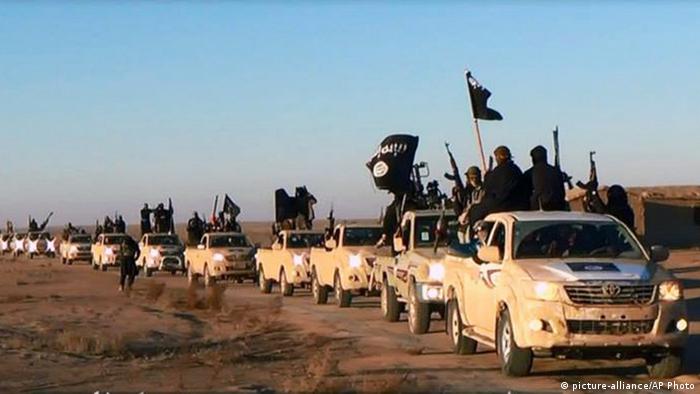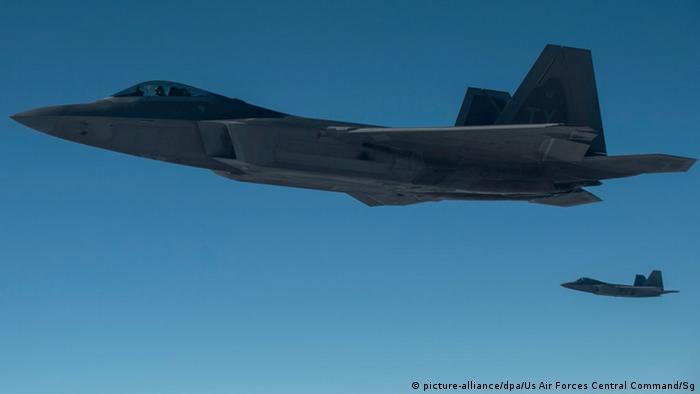Drying up 'Islamic State' sources of financing
'ISLAMIC STATE'
Drying up 'Islamic State' sources of financing
At their meeting in Turkey, G20 leaders have pledged to help dry up the financial sources of the "Islamic State." That's easier said than done, and terror attacks are cheap. Where does the money come from?
It's widely known that the "Islamic State" (IS) has huge financial resources at its disposal. The German government reckons that the terrorist organization can fall back on a capital stock of up to $2 billion (1.87 billion euros).
IS current receipts are also sizeable and come from a number of sources, ranging from selling or smuggling oil and antiques and looting banks to confiscating people's property, collecting ransom money or taxes plus donations.
But mostly, the exact sources of income are not really well known. "We don't have any credible information on this," - that's how the German government has repeatedly responded to relevant questions asked by the opposition Left party.
No big dependence on foreign sources
In contrast to organizations such as al-Qaeda, the "Islamic State" is no loosely-knit network, but functions like a state. It controls whole areas, including their resources and local populations. The German government therefore believes IS' dependence on foreign financial sources to be rather small.
"The 'Islamic State' controls a broad territory and is thus in a position to generate capital on the ground and create financial flows that al-Qaeda just hasn't had," said Reinhard Schulze, an Islamic scholar at Bern University. And this makes it harder for the international community to cut off the terrorists' financing.
It's true, though, that IS' income from smuggling oil has been decreasing of late. The OECD's Financial Action Task Force (FATF) says the reason for this is that the oil price has been so low, but also because better controls are now in place in Turkey, Iraq and in the Kurdish areas. But the group says more could be done.
According to a recent FATF report, more information is required about the origin of the smuggled oil, the middlemen in the process, the buyers, traders and delivery routes.
Air strikes have also taken a toll on IS' income from oil. On November 11, for instance, the US Defense Department reported the destruction of fuel tankers by fighter jets in Deir Essor province in Syria.
In the spring of this year, the German government believed the "Islamic State" received no more than $200,000 per day from its oil business. That's $6 million per month. Others have come up with significantly higher estimates, but reliable information is scarce.
High income, high costs
Taxes and fees collected in occupied areas have been a crucial source of IS income. Locals there have to give the occupants between 5 percent and 15 percent of their earnings, Berlin reckons. Add to it a special tax for non-Muslims and fees for electricity, water, housing, telecommunications, transport and freight traffic.
When IS forces get under pressure militarily, it directly impacts their revenues. Information provider IHS states that since July the "Islamic State" has continuously lost territory and income, reducing its ability to pay its fighters.
Estimates as to how many fighters the organization has vary widely. Towards the end of 2014, the CIA spoke of 30,000 troops, while security expert Daveed Gartenstein-Ross from Georgetown University thinks 100,000 is a more likely figure. Such a troop strength translates into a costly affair.
The German government says plain fighters get $400 to $500 per month which means costs would easily amount to 15 million dollars a month just for paying fighters even on the basis of very cautious estimates regarding troop strength.
Berlin says there are strong hints IS also gets money from private donors in the Gulf States. Oftentimes, donations are collected under the guise of aid organizations. However, it's believed that the importance of such donations for the organization's income has diminished.
Taxes and fees
FATF officials presented a new report at the recent G20 summit in Turkey. It said that since 2010, there had been 863 convictions in Saudi Arabia on charges of financing terrorist activities, with 100 such cases registered in the US. But overall, criminal convictions on such charges are few and far between. Only 33 out of the 194 countries scrutinized by FATF have seen culprits sentenced for financing terrorist activities.
Thirty-seven countries have levied sanctions on individuals and organizations and frozen their accounts. Once again, Saudi Arabia is in the top spot, having frozen about 31 million euros by mid-August, with the US barring access to 20 million euros and Israel freezing 6 million euros. The upshot of it all is that the fight against terrorist financing has been lacking global momentum, with most nations not making use of instruments provided under their respective national laws.
Low-budget terror
What's compounding the matter is that often financial transactions are made outside of the banking system. Islamic scholar Reinhard Schulze says IS has created a very informal transaction system that seems to be based on the Arab Hawala system dating back to the Middle Ages and relying on mutual trust.
"It's hard to analyze even for financial experts," Schulze maintained, with payments made in cash globally and anonymously, while ensuring that those giving the money do not know who receives it. And, he adds, those who receive the money do not know where it comes from.
Irrespective of IS' financial situation, the problem remains that terrorists attacks like the most recent ones in Paris can be organized and carried out without a big budget. The Norwegian Institute for Defense Studies has analyzed the 40 bloodiest attacks carried out in Europe between 1994 and 2013. It said three out of four cost the terrorists less than $10,000.
"You can get Kalashnikovs or explosives for little money on the black market," said Hans-Martin Lang from Germany's Federal Financial Supervisory Authority (Bafin). "The main problem is that many transactions happen below the radar, making it so hard for financial institutions to get wind of such payments."
And so, IS terrorists look unlikely to be cut off from all resources any time soon. That's why information provider IHS believes the capability of the "Islamic State" to carry out attacks abroad has not really become any weaker despite recent military losses in Syria and Iraq.


Comments